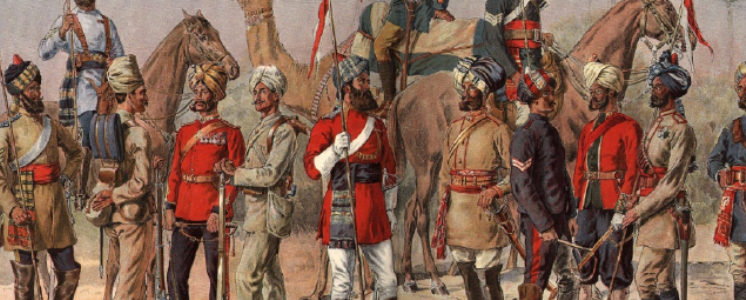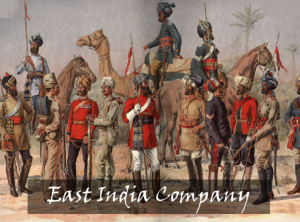
East India Company

One of East India company’s director said “ East India company had become an Empire within an Empire”, with absolute power to make war or peace anywhere in the East.
East India company had credited vast and sophisticated administration and civil service in India and built much of London’s Docklands and came close to generating half of Britain’s trade with its annual spending in Britain around £8.5m equaling a quarter of British Governments annual expenditure.
The East India Company formed for the exploitation of trade with East and Southeast Asia and India , incorporated by royal charter on December 31 1600.
The company is now referred to as “ the grandest society of merchants in the Universe”, with its private army larger than those of all nation-states and its power encircled the globe. Parliamentarian Edmund Burke wrote” The constitution of the Company began in Commerce and ended in Empire.”
Their headquarters on Leaden Hall Street in the City of London lies buried beneath the foundations of Richard Rogers’s glass-and-steel Lloyd’s buildings with no blue memorial plaques.
The East India Company remains history’s most ominous warning about the potential for the abuse of corporate power and stealthy means by which the interests of shareholders can seeming become those of the state.
However, people even now voice fears about the power of corporations and the way global companies can find ways around the laws and the legislatures of individuals nation-states, sounds like 18th century commentators like Horace Walpole who decried the way that EIC wealth had corrupted parliament: “ What is England now?” he asked , but “ a sink of Indian wealth, filled by nabobs with Senate sold and despised.”
In September 24,1599, the history of the East India Company began, while William Shakespeare was writing Hamlet in his house downriver from Globe in Southwark, a group of Londoners gathered just 20 minutes north across the Thames in a rambling , half timbered building off Moorgate fields. A diverse cross section of Elizabethan London that came to the Founders Hall, to petition the ageing Queen Elizabeth I, then a bewigged and painted woman of 66, to start up a Company “ to venter in the pretended voyage to ye East Indies and other islands and countries thereabouts there to make trade”.
The East India Company was first conceived as a joint stock corporation, open to all investors, as the commodities they wished to procure were extremely expensive and they were carried in huge ships which needed to be manned by large crews and protected by artillery masters and professional musket-men. The idea of a joint stock company derived from Tudor England’s most brilliant and revolutionary innovations. A few decades earlier in 1553, a previous generation of London merchants had begun the process of founding the world’s first chartered joint-stock company: the Muscovy Company.
When East India Company was founded in 1599, England was a relatively impoverished, largely agricultural country, which had spent half a century at war with itself over the most divisive subject of the time: religion.
It is not the British government that began seizing chunks of India in the mid-18th century, but a dangerously unregulated private company headquartered in one small office, five windows wide, in London and managed in India by a violent, ruthless and mentally unstable corporate predator Robert Clive India’s transition to colonialism, which took place under a for-profit corporation which existed entirely for the purpose of enriching its investors. The historians site many reasons for the EIC’ success the fracturing of Mughal India into tiny, competing states, the military edge of more advanced European soldiers and the innovations in governance, taxation and banking that allowed the Company to raise vast sums of ready money at a moment’s notice.
The company had two targets in its sights one was the lands where its business was conducted and the other was the country that give it birth, as its lawyers and lobbyists and MP shareholders slowly and subtly worked to influence and subvert the legislation of Parliament in its favor. It was EIC who invented corporate lobbying in 1693, less than a century after its foundation, the company was discovered for the first time to be using its own shares for buying MPs annually shelling out £1,200 a year to prominent MPs and ministers.
The EIC’s conquest of India remains the supreme act of corporate violence in history.
